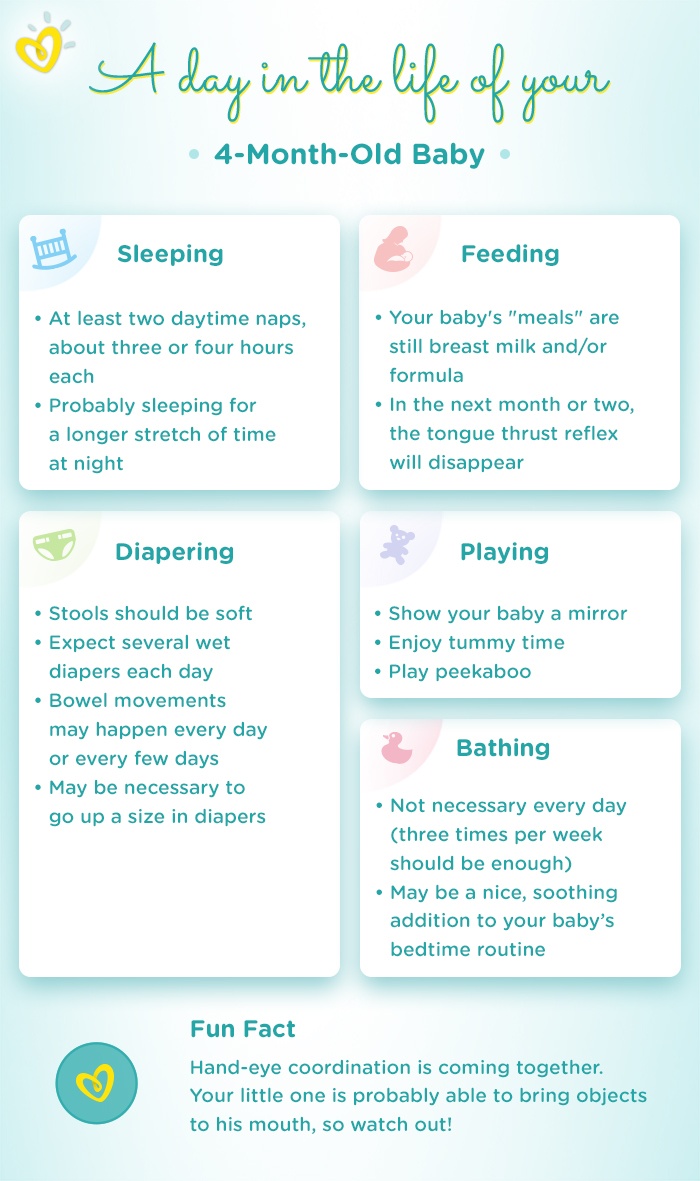
4 Months Baby Care: A Comprehensive Guide for Parents
The fourth month marks a significant milestone in a baby’s development, bringing about a plethora of changes and challenges for parents. This comprehensive guide will delve into the intricacies of 4-month baby care, providing essential information and practical tips to ensure the well-being and happiness of your little one.
Physical Development
- Motor Skills: At 4 months, babies exhibit remarkable progress in their motor skills. They can now hold their heads up steadily, roll over from back to tummy, and reach for objects with greater precision.
- Sensory Development: Their senses continue to develop rapidly. They can track moving objects with their eyes, respond to different sounds, and explore their surroundings with their hands and mouth.
- Growth: Babies typically gain 2-3 pounds and grow 1-2 inches in length during this month.
Feeding
- Breastfeeding: If you are breastfeeding, your baby may still feed 8-12 times per day. Continue to offer the breast on demand and allow your baby to self-regulate their intake.
- Formula Feeding: Formula-fed babies may take 4-6 bottles per day, each containing 4-6 ounces of formula. Follow the manufacturer’s instructions for preparation and feeding.
- Introducing Solids: At around 4 months, some babies may be ready to start exploring solid foods. Begin with single-ingredient purees, such as rice cereal or pureed fruits and vegetables. Start with small amounts and gradually increase as tolerated.
Sleep
- Sleep Patterns: Babies at this age typically sleep for 14-16 hours per day, with 2-3 naps during the day. Their sleep patterns may still be irregular, but they may start to develop a more predictable routine.
- Creating a Sleep Environment: Establish a calming sleep environment by keeping the room dark, quiet, and cool. Use a white noise machine or fan to block out distracting sounds.
- Bedtime Routine: Implement a consistent bedtime routine to signal to your baby that it’s time to sleep. This could include a warm bath, a gentle massage, and reading a story.
Diapering
- Frequency: Babies at this age typically have 6-8 wet diapers and 2-3 bowel movements per day.
- Diaper Changes: Change your baby’s diaper frequently to prevent diaper rash. Use gentle wipes and apply a diaper cream to protect their skin.
- Signs of a Wet Diaper: The diaper will feel heavy and wet to the touch.
- Signs of a Dirty Diaper: The diaper will have a strong odor and may contain solid or semi-solid waste.
Bathing
- Frequency: Bathe your baby 2-3 times per week.
- Water Temperature: Use lukewarm water and check the temperature with your elbow before bathing your baby.
- Bath Products: Use gentle, unscented baby soap and shampoo. Avoid using harsh detergents or bubble baths.
- Safety: Never leave your baby unattended in the bath.
Health and Wellness
- Immunizations: At 4 months, your baby will receive their second round of vaccinations, including DTaP, Hib, and polio.
- Teething: Some babies may start teething around this time. Offer a teething ring or cold washcloth to soothe their discomfort.
- Gas and Colic: Gas and colic are common in babies at this age. Burp your baby frequently and try using gripe water or a warm bath to relieve discomfort.
- Constipation: If your baby is having difficulty passing bowel movements, offer them plenty of fluids and consult with your healthcare provider.
Play and Interaction
- Tummy Time: Continue to encourage tummy time for at least 30 minutes per day. This helps strengthen their neck and back muscles.
- Interactive Play: Engage your baby in interactive play, such as peek-a-boo, singing songs, and reading stories.
- Toys: Provide your baby with age-appropriate toys that stimulate their senses and encourage their development.
Bonding and Attachment
- Skin-to-Skin Contact: Hold your baby close to your skin as much as possible. This promotes bonding and helps regulate their temperature.
- Talk and Sing: Talk to your baby and sing songs to them. This helps them develop language skills and strengthens your bond.
- Respond to Cues: Pay attention to your baby’s cues and respond promptly to their needs. This helps them feel secure and loved.
Common Concerns
- Crying: Babies at this age may cry for a variety of reasons, including hunger, tiredness, discomfort, or boredom. Try to identify the cause and respond accordingly.
- Sleep Regression: Some babies may experience a sleep regression around this time. Be patient and consistent with your sleep routine.
- Separation Anxiety: Babies may start to show signs of separation anxiety when they are away from their primary caregivers. Reassure them that you will be back and provide them with comfort objects.
When to Call the Doctor
- Fever: A fever of 100.4°F or higher
- Persistent Crying: Crying that lasts for more than 3 hours and cannot be consoled
- Difficulty Breathing: Rapid or shallow breathing, wheezing, or grunting
- Vomiting or Diarrhea: Persistent vomiting or diarrhea that lasts for more than 24 hours
- Rash: A rash that is red, swollen, or itchy and does not improve with home care
Conclusion
Caring for a 4-month-old baby is a rewarding yet challenging experience. By understanding their developmental milestones, providing them with proper care, and responding to their needs, you can ensure their well-being and foster a strong bond. Remember to seek professional advice if you have any concerns about your baby’s health or development. With patience, love, and knowledge, you can navigate this exciting chapter in your baby’s life with confidence.
